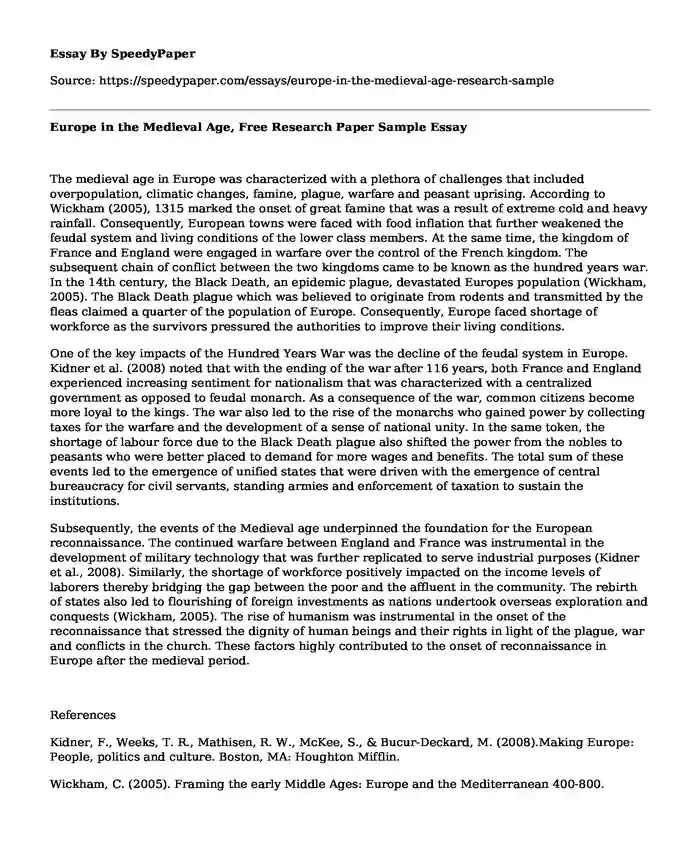The medieval age in Europe was characterized with a plethora of challenges that included overpopulation, climatic changes, famine, plague, warfare and peasant uprising. According to Wickham (2005), 1315 marked the onset of great famine that was a result of extreme cold and heavy rainfall. Consequently, European towns were faced with food inflation that further weakened the feudal system and living conditions of the lower class members. At the same time, the kingdom of France and England were engaged in warfare over the control of the French kingdom. The subsequent chain of conflict between the two kingdoms came to be known as the hundred years war. In the 14th century, the Black Death, an epidemic plague, devastated Europes population (Wickham, 2005). The Black Death plague which was believed to originate from rodents and transmitted by the fleas claimed a quarter of the population of Europe. Consequently, Europe faced shortage of workforce as the survivors pressured the authorities to improve their living conditions.
One of the key impacts of the Hundred Years War was the decline of the feudal system in Europe. Kidner et al. (2008) noted that with the ending of the war after 116 years, both France and England experienced increasing sentiment for nationalism that was characterized with a centralized government as opposed to feudal monarch. As a consequence of the war, common citizens become more loyal to the kings. The war also led to the rise of the monarchs who gained power by collecting taxes for the warfare and the development of a sense of national unity. In the same token, the shortage of labour force due to the Black Death plague also shifted the power from the nobles to peasants who were better placed to demand for more wages and benefits. The total sum of these events led to the emergence of unified states that were driven with the emergence of central bureaucracy for civil servants, standing armies and enforcement of taxation to sustain the institutions.
Subsequently, the events of the Medieval age underpinned the foundation for the European reconnaissance. The continued warfare between England and France was instrumental in the development of military technology that was further replicated to serve industrial purposes (Kidner et al., 2008). Similarly, the shortage of workforce positively impacted on the income levels of laborers thereby bridging the gap between the poor and the affluent in the community. The rebirth of states also led to flourishing of foreign investments as nations undertook overseas exploration and conquests (Wickham, 2005). The rise of humanism was instrumental in the onset of the reconnaissance that stressed the dignity of human beings and their rights in light of the plague, war and conflicts in the church. These factors highly contributed to the onset of reconnaissance in Europe after the medieval period.
References
Kidner, F., Weeks, T. R., Mathisen, R. W., McKee, S., & Bucur-Deckard, M. (2008).Making Europe: People, politics and culture. Boston, MA: Houghton Mifflin.
Wickham, C. (2005). Framing the early Middle Ages: Europe and the Mediterranean 400-800. Oxford: Oxford University Press.
Cite this page
Europe in the Medieval Age, Free Research Paper Sample. (2019, May 14). Retrieved from https://speedypaper.net/essays/europe-in-the-medieval-age-research-sample
Request Removal
If you are the original author of this essay and no longer wish to have it published on the SpeedyPaper website, please click below to request its removal:
- The Mississippi Freedom Summer Project - Essay Sample for Students
- Electoral College Essay Samples
- Free Essay Example: Classification of Art
- Essay Sample on the Use of Vaccinations
- Analysis Paper Example on Marketing Mix and Four P's of Coca-Cola Company
- Essay Sample on Market Penetration Strategy
- Essay Sample on The Epic of Beowulf in the Geat Land.
Popular categories





